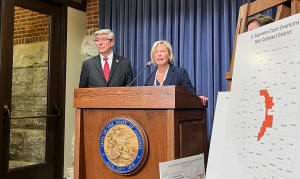Democrats argue Republicans waited too long to file latest redistricting
lawsuit
[March 27, 2025]
By Ben Szalinski, Bridgette Fox
SPRINGFIELD – Two elections have come and gone since the Illinois
General Assembly passed new legislative maps, and Democrats’ attorneys
argue in a new court filing that Illinois Republicans have lost their
opportunity to challenge the maps in court.
A case brought to the Illinois Supreme Court by House Republican Leader
Tony McCombie, R-Savanna, asked the court to reject the current
legislative map for its partisan bias and have a special master redraw
the districts. But it is not yet known whether the court will take the
case.
McCombie along with four voters, alleged the voting district maps are
not “compact,” a requirement of the state constitution, which has led to
allegations of gerrymandering in favor of Democrats.
While the court hasn’t yet said whether it will hear the case, it did
ask both parties to explain whether McCombie and the other plaintiffs
filed the lawsuit in a timely manner, a factor to be considered in
deciding whether to take the case.
The Senate Republican caucus is not involved in the case.
A lawsuit from multiple parties challenging the map was rejected in 2021
by a federal three-judge panel, which rejected arguments that the map
diluted the voting strength of racial minorities. However, Republicans’
lawyers argue new data from the 2022 and 2024 elections prove the map is
the product of partisan gerrymandering.
The Illinois Attorney General’s Office on behalf of the State Board of
Elections said in a filing it isn’t taking a position on the complaint’s
timeliness. However, the court allowed House Speaker Emanuel “Chris”
Welch, D-Hillside, and Senate President Don Harmon, D-Oak Park, to
intervene as defendants.

Leading the case for General Assembly Democrats are three well-connected
attorneys in Democratic circles, including Mike Kasper. Kasper is a
long-time elections lawyer who previously worked as a top attorney for
the Democratic Party of Illinois and was former House Speaker Mike
Madigan’s go-to lawyer for political issues.
Kasper, who was described by Rep. Ryan Spain, R-Peoria, at a Statehouse
news conference last week as “Darth Vader himself, Madigan’s henchman,
the prince of darkness,” has successfully defended previous legislative
maps against lawsuits.
“To allow plaintiffs to proceed now, mid-decade, with their proposed
redistricting challenge would invite political parties to wait until
they have a wave election and use their best election results to justify
a partisan challenge to the legislative map,” the Democrats’ lawyers
said in their filing.
The current state House and Senate maps were passed in 2021 and
implemented in 2022 following the 2020 census. Republicans have not
gained any seats in the General Assembly since then, keeping them as the
minority.
Republicans and supporters of redistricting reform in Illinois haven’t
had much success in court in recent decades. The Illinois Supreme Court
blocked a 2016 citizen-driven referendum attempting to create an
independent redistricting commission. The lead plaintiff in that case
was John Hooker, a now-convicted conspirator in the “ComEd Four” case.
Other Republican efforts to throw out the 2011 legislative maps were
also rejected by the courts.
[to top of second column]
|

House Republican Leader Tony McCombie, R-Savanna, speaks at a news
conference at the Statehouse on Jan. 28, 2025 about the House GOP’s
lawsuit against Illinois’ legislative maps. (Capitol News Illinois
photo by Bridgette Fox)

Lawyers for Welch and Harmon said in a March 19 filing Republicans
should have filed their lawsuit with the Illinois Supreme Court after
the maps were enacted in 2021 instead of filing it more than three years
later.
“These arguments could have, and should have, been raised years ago.
Plaintiffs cannot claim they did not know about the map,” Democrats’
lawyers argued in a written brief.
They cited claims Republican lawmakers made during House debate on the
maps in 2021 based on data Republicans shared showing the maps were not
compact and drawn for Democrats’ benefit.
McCombie’s lawyers responded that they were following their
interpretation of a U.S. Supreme Court ruling that would require data
from two election cycles to show any discriminatory effect caused by
gerrymandering.
Her lawyers said Democrats were putting them in a “catch-22” situation,
comparing it to a “heads I win, tails you lose” game.
“If a plaintiff brings a gerrymandering challenge right after a map is
passed, then Intervenors would argue that the claim should fail on the
merits because of insufficient evidence of the map’s effects,”
McCombie’s lawyers wrote. “And if a plaintiff waits to collect evidence
of the map’s effects, Intervenors would argue that the claim should fail
procedurally.”
Republicans’ lawyers argued that the 2024 election was the last time the
district map was used, meaning there’s a recent “injury” to voters and
Republicans, which could also satisfy timeliness requirements. They also
cite a common law doctrine which says the government generally isn’t
subject to statutes of limitations.
Democrats also argued any redistricting the court might order would
interfere with the Senate’s staggered terms. Illinois senators have
terms of either two or four years so the entire body is not up for
reelection at the same time.
Democrats’ lawyers argued senators elected in 2024 could have the
four-year term they were elected to wrongfully reduced.
McCombie’s lawyers rejected that idea citing case law in which
redistricting still allowed representatives to finish out the term for
which they were elected, and that a mapmaker could separately be
directed to not unseat any senators when redrawing districts.
McCombie has requested oral arguments for the suit, but the court has
yet to say what the next steps will be in the case.
Capitol News Illinois is
a nonprofit, nonpartisan news service that distributes state government
coverage to hundreds of news outlets statewide. It is funded primarily
by the Illinois Press Foundation and the Robert R. McCormick Foundation.
 |